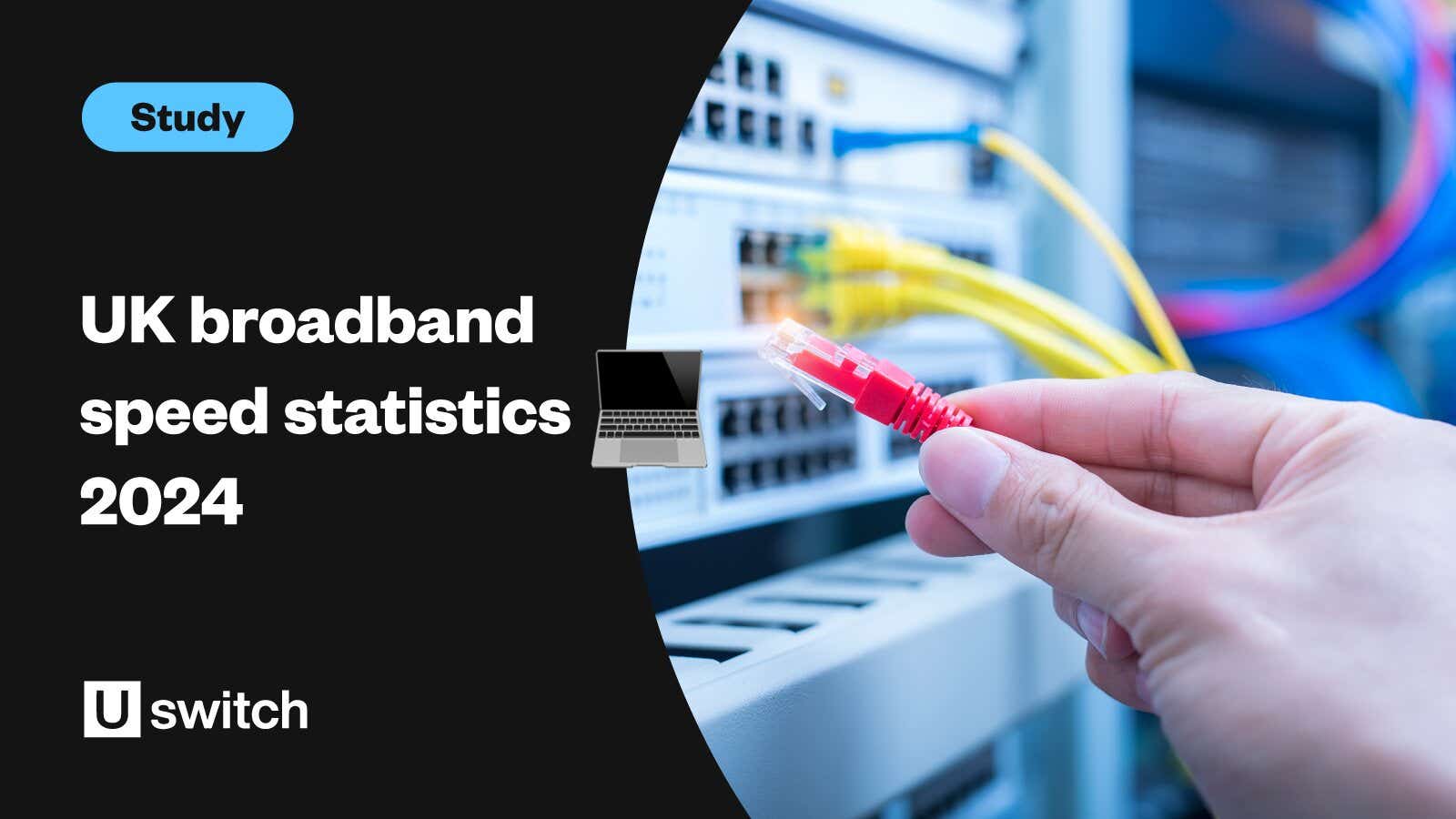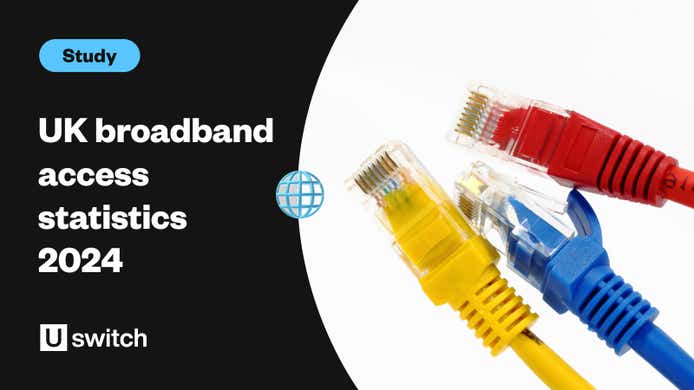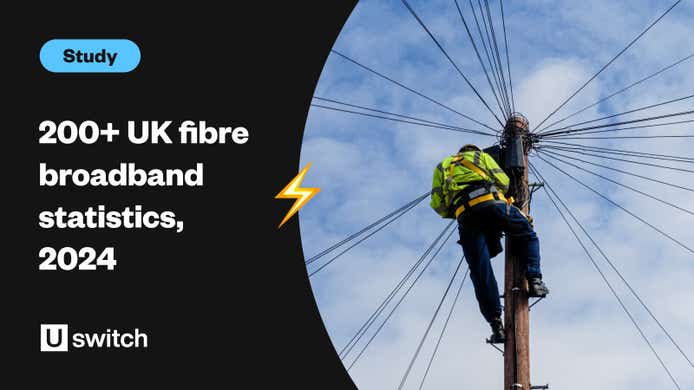With the digital age showing no signs of slowing down, the prominence of the internet in our everyday lives increases by the year.
With the internet now firmly established as the go-to place for many people to consume media, stream entertainment, and manage their work life, broadband speeds in the UK have regularly evolved to cope with the increasing demand.
But how fast is broadband around the UK? We’ve collated the latest UK broadband speed statistics for 2024, covering average UK download speeds, regional differences, and how the speed of broadband has changed over time.
Quick overview of UK broadband speed statistics 2024
As of 2024, the median average internet speed in the UK was 73.21Mbps. This is an increase of more than 12% from September 2022, equating to a rise of nearly 8Mbps in less than a year.
Average upload speeds increased by almost a fifth (18%) between September 2022 and March 2023, to 18.4Mbps.
Data shows that 99.7% of UK homes have access to decent internet (10Mbps or above)
Southampton has the fastest average download speeds of anywhere in the UK, with average speeds of 166.677Mbps.
As of March 2023, superfast products accounted for 93% of all home broadband lines.
UK broadband speed statistics
Choosing a broadband package that is right for you will largely depend on your budget, what you intend to use your internet for, and the broadband speed you require to complete those activities.
Uswitch classifies* broadband speeds into the following four main categories:
Standard broadband: Uses ADSL technology to provide average download speeds of around 10-11Mbps.
Superfast broadband: Uses fibre-optic cables to deliver a range of speeds, from 30-100Mbps.
Ultrafast broadband: Delivers speeds between 100-1,000Mbps.
Gigabit broadband: Providing internet speeds of 1,000Mbps (1Gbps) and above.
The UK Government criteria for a “decent” broadband service is generally described as having a download speed of at least 10 Mbps and an upload speed of at least 1Mbps. This is what you usually get with a standard broadband package, and enables you to carry out tasks like browsing the internet, online shopping, and sending emails.
*This is based on what broadband providers refer to in their products.
Average UK broadband download speed statistics
As of 2023, the median average internet speed in the UK was 73.21Mbps. This is an increase of more than 12% from September 2022, equating to a rise of nearly 8Mbps in less than a year.
UK broadband speed statistics reveal that, out of 100 UK households, 93 will now opt for a superfast package with advertised download speeds of 30Mbps or higher. As of September 2022, 8% chose ultrafast broadband packages (average advertised speeds of at least 300Mbps according to Ofcom).
A breakdown of average UK broadband speeds over time (2017-2023)

The latest UK broadband statistics from Ofcom found that the median average download speed in the UK was 69.4Mbps, as of March 2023. This represents a rise of around 10.1Mbps (17%) since March 2022.
The latest UK broadband statistics from Ofcom found that the median average download speed in the UK was 69.4Mbps, as of March 2023. This represents a rise of around 10.1Mbps (10%) since March 2022.
The median average upload speed in the UK over this period was 18.4Mbps – up almost three-quarters (73%) from March 2022.
UK average download speeds by the time of day
UK average download speeds tend to slow during busy periods when broadband networks suffer the effects of—what’s known as—contention. In plain terms, this means competition for resources.
Across all connections in March 2023, the average UK daily minimum speed (63.3Mbps) was around 89% of the average maximum speed (71Mbps). This represents a 3.9Mbps rise in the average minimum speed, and a 4.3Mbps increase for the average maximum speed, since September 2022.
A breakdown of median average UK broadband speeds by time of day

UK broadband speed statistics reveal that, as of March 2023, the average 24-hour speed stood at 69.4Mbps for all connections, yet only 11.7Mbps for those between 10-30Mbps advertised speed. This was contrasted by average 24-hour speeds of almost 66.8Mbps for connection types with 30Mbps or higher.
Ofcom research shows that across all connections, the average 8-10pm peak-time speed (67.7Mbps) was 98% of the average maximum speed, compared to 97% for fibre and cable lines with advertised speeds of 30Mbps or more, and 96% for lines between 10-30Mbps. In January 2023, the highest-available average download speeds were recorded between midnight and 6am.
All technologies (such as routers, satellite connections, and mobile hubs) delivered over 96% of their 12am to 5.59am average speeds between 9pm and 9.59pm, showing the consistency of performance in the UK broadband market in September 2022.
Fixed broadband speeds vs reported internet speeds
Interested in finding out the difference between fixed broadband package speeds and the reported internet speeds, Uswitch analysed Ofcom fixed broadband performance data from homes across the UK.
We obtained data on the region, internet service provider (ISP), broadband access statistics, and the peak recorded download speeds from over 3,300 homes with fixed broadband. From this, we found the listed average download speeds for broadband connections in each home using each ISP website.
The percentage difference between the listed ISP broadband download speeds versus the connection’s reported peak download speed was then calculated for each ISP, broadband package, and UK region.
A breakdown of fixed broadband speeds vs reported internet speed statistics across various UK internet service providers (ISPs)
| Internet service provider | Average download speed (%) |
|---|---|
| Virgin | 97.58 |
| Zen | 90.67 |
| BT | 88.74 |
| Plusnet | 87.72 |
| EE | 86.09 |
| Sky | 83.98 |
| Vodafone | 83.74 |
| TalkTalk | 81.39 |
(Source: Uswitch)
Virgin had the highest average download speed of all internet service providers (ISPs) analysed, with a difference of 97.58%. The only other ISP with an average download speed of 90% or more is Zen, with 90.67%. Comparatively, TalkTalk’s average download speed is just 81.39%.
Fixed broadband package download speeds vs reported internet speeds across various ISP broadband packages (2022)
| ISP broadband connections | Package download speed (Mbps) | Reported download speed average (Mbps) |
|---|---|---|
| BT 160 FTTP | 150 | 145.83 |
| BT 38 FTTC | 36 | 26.82 |
| BT 52 FTTC | 50 | 43.18 |
| BT 76 FTTC | 74 | 62.95 |
| BT 76 FTTP | 74 | 73.8 |
| EE 38 FTTC | 36 | 32.2 |
| EE 76 FTTC | 74 | 61.72 |
| Plusnet 38 FTTC | 36 | 29.42 |
| Plusnet 76 FTTC | 66 | 60.61 |
| Sky 38 FTTC | 36 | 29.74 |
| TalkTalk 38 FTTC | 38 | 32.23 |
| TalkTalk 76 FTTC | 80 | 62.26 |
| Virgin 100 Cable | 108 | 109.47 |
| Virgin 1000 Cable | 1130 | 953.4 |
| Virgin 200 Cable | 213 | 208.58 |
| Virgin 350 Cable | 362 | 374.69 |
| Virgin 500 Cable | 516 | 540.35 |
| Vodafone 76 FTTC | 73 | 60.17 |
| (Source: Uswitch) |
We found that three out of five broadband connections from Virgin Media had a higher average download speed than stated in their package. Virgin’s M500 cable connection lists its package speed as 516Mbps, but the average download speed reported via Ookla reaches 540.35Mbps.
In terms of fastest speeds, Virgin Media’s 1.1Gb service had the fastest average download speed at 1,139 Mbps in September 2022, as well as joint-fastest average upload speed alongside BT’s 300Mb service, at 51 Mbps.
Regarding BT, its broadband download speeds are also close to those listed in its package details. However, the BT 38 Superfast connection is reportedly 10 Mbps less than stated in the package (36Mbps vs 26.82Mbps).
On the other end of the spectrum, TalkTalk has the worst package speed vs reported internet speed, with their 38 FTTC and 76 FTTC packages both failing to reach the download speeds consumers pay for.
A breakdown of UK average download speed of fixed broadband packages (2021)

According to UK average download speed statistics from our study, Virgin 100, 350, and 500 cable broadband packages each outperformed their advertised download speeds when it came to reported download speed figures. Virgin’s 500 cable broadband advertises speeds of 516Mbps, yet reported download speed stats in 2021 indicate customers were receiving nearer 540 Mbps on average.
Our findings indicate that the vast majority of UK broadband providers were delivering somewhere between 80-90% of advertised broadband speeds to customers in 2021. BT’s 160 and 76 FTTP services both achieved scores in the high 90s for their reported download speeds as a percentage of their advertised speeds (145.83Mbps and 73.9Mbps, respectively).
At the other end of the scale, BT’s 38 FTTC package was the joint-lowest package in our study for advertised download speeds at 36Mbps, yet achieved less than 75% of this when it came to reported download speed figures. This was followed closely by Talk Talk’s 76 FTTC service, reporting almost 78% of its advertised 80Mbps package.
A breakdown of UK average download speed by region
| Region | Average download speed (%) |
|---|---|
| London | 93.6 |
| Yorkshire & Humberside | 90.81 |
| North East | 90.39 |
| South West | 90.17 |
| South East | 89.4 |
| Northern Ireland | 88.88 |
| East Midlands | 88.33 |
| West Midlands | 88.2 |
| Wales | 88.02 |
| East | 86.1 |
| North West | 86.08 |
| Scotland | 85.11 |
(Source: Uswitch)
England’s capital, London, has the fastest average download speed of all regions in the UK, with an average download speed of 93.6%. Yorkshire and the Humber, the North East and South West follow behind with average download speeds in the 90% range.
Scotland, on the other hand, fares the worst of all, with an average download speed of 85.11%—a difference of 8% from London at the top of the table.
Check out our latest broadband deals in London to help find a package that is right for you.
Internet download speed statistics by UK local authority
Which local authority has the fastest and slowest download speeds in the UK?
To find out, we utilised iOS and Android Speedtest data from Q2 2022 via Ookla. We then applied this to local authority boundaries, as per the Office of National Statistics, to highlight the average download, upload and latency performance speeds for each local authority.
A breakdown of the UK local authorities with the fastest and slowest download speeds

Southampton has the fastest average download speed, clocking in at 166.677Mbps. This was closely followed by Stockton-on-Tees, with a download speed of 166.356Mbps.
Third place goes to Newham with a download speed of 157.795Mbps, fourth to Coventry (157.652Mbps), and fifth to Peterborough (157.509Mbps).
On the other end of the scale, the local authority with the slowest download speed is the Isles of Scilly, with an average download speed of 24.536Mbps—142.141Mbps slower than first place Southampton.
A breakdown of the UK local authorities with the fastest and slowest upload speeds

Across the UK, the average upload speed in September 2022 was 15.5Mbps - an increase of 46% from March 2022. Over the same time, average upload speed for superfast connections increased by 31% (or 4.1 Mbps) to 17.3 Mbps. This was likely driven by more full fibre connections with ‘symmetrical’ download and upload speeds.
The London Borough of Tower Hamlets takes the crown for the fastest average upload speed, measuring an impressive 107.851Mbps. Tower Hamlets is followed closely behind by Milton Keynes, with an average speed of 105.531 Mbps.
Southampton, which has the fastest average download speed, also has the third-fastest upload speed, clocking in at an average of 102.859 Mbps.
On the other end of the scale, as well as having the slowest download speed in the UK, the Isles of Scilly has the slowest upload speed too. The local authority racks up an average upload speed of just 6.555 Mbps, which is almost 16 times slower than Tower Hamlets in first place.
Are you suffering from slow broadband speeds? Check out our guide to find out why your internet is so slow and how to fix the issue.
A breakdown of the UK local authorities with the fastest and slowest latency speeds

Online gaming statistics reveal that the best broadband for online gaming will provide a response time of less than 100 milliseconds (ms) in order to provide a good experience, (although some online gaming apps require 50ms).
Our research identified that the London Borough of Tower Hamlets has the best average latency speed, measuring just 9.554 ms. Second place goes to Newham, another London Borough, with an equally impressive latency speed of 9.846 ms.
Latency definition: Latency refers to the delay before a transfer of data begins. A connection with low latency often feels more responsive for simple tasks like internet browsing.
Residents in the Outer Hebrides in Scotland don’t have it quite so good, clocking an average latency speed of 58.874 ms. This is still reasonable and would allow residents to carry out simple tasks online, however, there is a considerable difference of 49.32 ms from Tower Hamlets in first place.
Which UK street has the fastest and slowest broadband speed?
Every December, we analyse all broadband speed tests that were run throughout the year using our broadband speed test to identify the UK streets with the fastest and slowest internet speeds.
A breakdown of the UK streets with the slowest and fastest broadband (2021)

As of December 2021, the street with the slowest broadband speed was Wistaston Road in Crewe, where residents have an average broadband speed of just 0.25Mbps. At this speed, according to our download time calculator, it would take residents over two-and-a-half days to download a two-hour HD film and almost 24 hours to download a 45-minute HD TV show.
Check out our latest TV and broadband deals to help find a product that is right for you.
By contrast, residents living on Britain’s fastest street for broadband, Haul Fryn in Birchgrove, Swansea, experience an average speed of 882.03Mbps. This means Wistaston Road is a staggering 3,567 times slower than Haul Fryn, and residents would only have to wait about a minute to download the same film or a mere 24 seconds to download the same show.
Global average internet speeds
Which countries have the fastest average internet speed in the world?
World internet speed statistics show that Singapore has the fastest average broadband speeds across the globe, hitting 284.05Mbps. This is 4.5% faster than the next speediest broadband (Hong Kong).
A breakdown of the countries with the fastest average broadband

The country with the fastest broadband speeds outside of Asia is Chile, while Iceland has the fastest speeds in Europe, 4.11% quicker than their nearest European rival.
The United Kingdom is 49th on Speedtest’s list, with an average broadband speed of 106.54Mbps. This is 2.4 times slower than the average speed in the United States and 2.7 times slower than Singapore.
France is the second fastest country in Europe for average broadband speed, with speeds that are 5.7% quicker than the next fastest European country, which is Denmark. However, their speeds are still 14.3% slower than Singapore’s.
A breakdown of the countries with the fastest average mobile speeds

The country with the fastest average mobile speed in the world is Qatar. The Gulf state nation is the only country in the world where speeds exceed 300Mbps.
The two countries with the next fastest speeds are the nearby UAE and Kuwait, with speeds of 278.9Mbps and 229Mbps, respectively.
Iceland, Denmark, and Norway are the three European countries with the fastest average mobile speeds. Even still, Europe’s fastest nations have speeds which are close to half the recorded figures for Qatar in first place.
Which countries have the slowest average internet speed in the world?
The country with the slowest average broadband speed is Cuba, at 4.15Mbps. This was around 71 times slower than that of Singapore.
A breakdown of the countries with the slowest average mobile speeds in the world

East Timor has the slowest average broadband speed in Asia, typically registering 5.35Mbps. Belarus meanwhile has the slowest speeds in Europe, yet still 177% faster than Cuba.
A breakdown of the countries with the slowest average fixed broadband speeds in the world

In terms of average broadband speeds, Cuba once again has the slowest figures, with an average speed of 2.95Mbps. This is 15% slower than the next slowest broadband, Afghanistan.
The country with the slowest average broadband speed in Africa was Burundi, yet this was still 82% faster than Cuba’s speed.
How does the UK compare to other countries for average internet speed?
The UK ranks 51st in the world for fixed broadband speed and 49th for mobile speed.
A breakdown of the UK's average internet speeds and global rank
| Speed (Mbps) | Rank | |
| Fixed broadband | 55.01 | 51st |
| Mobile speeds | 106.54 | 49th |
In terms of fixed broadband, the UK is below Brazil, Uruguay, and Slovenia for speed, but its broadband is faster than Italy, South Africa, and Japan. The UK’s fixed broadband is 77% slower than the United States.
For mobile speeds, the UK falls behind Vietnam, Ireland and Saint Lucia, while boasting faster speeds than Germany, Argentina and Italy. The UK’s mobile speeds are 78% slower than France's.
UK broadband speed FAQs
What is my broadband speed?
There are various ways of finding out your broadband speed,. One of the most simple is to use an online speed test tool, which can quickly measure the Mbps of your broadband.
Your internet service provider may also have various tools which you can find by visiting their website. Plus, your router may have a built-in interface, which can show the speed it is running at.
What broadband speed do I need?
Ultimately, it will depend on what you want to do when you’re online. If you just want to check emails or casually surf the web, then 20-40 Mbps should suffice. Whereas if you stream, video call or work from home, then you’ll likely require somewhere between 50-80 Mbps.
Finally, if you are a heavy gamer, who enjoys streaming on a 4K TV, then you may require Ultrafast full-fibre broadband with speeds of 1,800 Mbps.
What broadband speed can I get?
The best way to find out what broadband speeds you’re eligible for is to use Ofcom’s broadband availability checker. You can input your address, and it will list what speeds are available to you.
What speed is superfast broadband?
Superfast broadband is a broad category of speeds, running from 30Mbps to 100Mbps. Anything faster than that falls into either the ultrafast or gigabit categories.
What is an acceptable broadband speed?
A good broadband speed can vary depending on your day-to-day needs as well as the number of people accessing the internet in your home. For example, an occasional internet browser would require far less than a family looking to stream videos, work from home, and conduct video calls daily.
Ofcom defines ‘decent broadband’ as a connection that can deliver download speeds of at least 10Mbps and upload speeds of at least 1Mbps, but there are an array of superfast and full fibre connections available that exceed these speeds considerably.
UK broadband speed sources and methodology:
View methodology
https://wisevoter.com/country-rankings/internet-speed-by-country/#united-kingdom
https://www.statista.com/statistics/896768/countries-fastest-average-mobile-internet-speeds/
https://www.ofcom.org.uk/__data/assets/pdf_file/0034/249289/connected-nations-uk-report.pdf
Data sources for “Fixed broadband speeds vs reported speeds” (accessed between 21/07/2022 – 25/07/2022):
https://www.sky.com/broadband#Comparison-table-BB
https://new.talktalk.co.uk/broadband
https://www.virginmedia.com/broadband/speeds
https://www.bt.com/products/broadband/deals
https://shop.ee.co.uk/broadband
https://www.vodafone.co.uk/broadband/deals/select-plan
https://www.zen.co.uk/broadband/broadband-results
Data sources for “Regional internet speeds” (accessed 21/07/2022):







